Email has become integral to modern communication, whether for personal or professional correspondence. Finding a dependable email service provider can be daunting with so many available. To simplify the selection process, we’ve compiled our list of the 10 best free email service providers of 2024 below; each offers unique features and benefits that may meet your requirements.
The 10 Best Free Email Service Providers
1. Google Free Email

Gmail, with over 1.2 billion active users since 2004, remains the top email service. Users value its intuitive design, robust security, and seamless integration with Google products such as Drive, Docs, and Calendar.
Features appropriate for professional email accounts include email templates and multiple signatures, an advanced search function, and keyboard shortcuts for mouse-free navigation.
However, Google services share the 15 GB free storage quota across services; therefore, photos and documents could eat away at available email storage space. To preserve more space for emails, download large files before deleting them from your inbox.
Pros:
- Went seamlessly with Google services
- Polished mobile apps with rich text editing and keyboard shortcuts;
- support for multiple mailboxes
- Ability to create and utilize email templates
Cons:
- Email storage space is shared among other Google services.
- Spam filters may not always provide accurate results.
2. Outlook.com
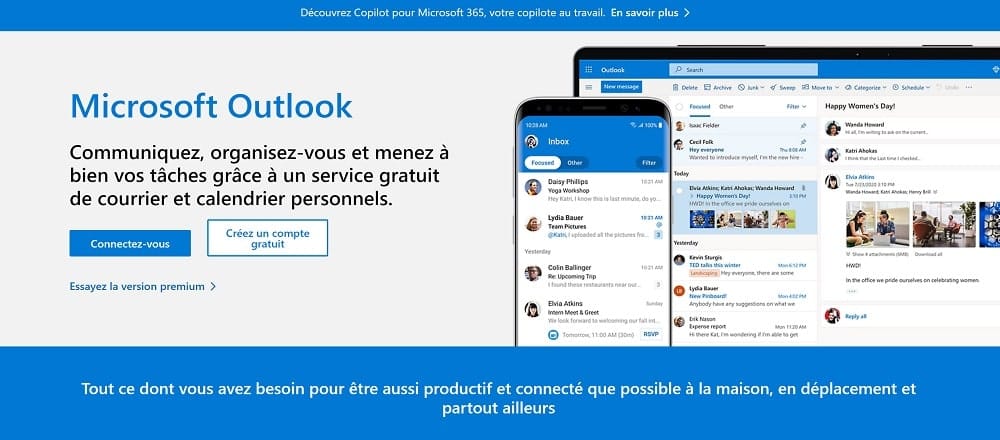
Outlook.com, created in 1996 by Microsoft, provides webmail services including contacts, tasks and calendaring to users worldwide. Due to its extensive features and its popularity among personal users, many compare Outlook.com with Gmail as the ultimate email client for personal use.
Outlook.com stands out with its Focused Inbox, a machine learning-powered feature that prioritizes emails by their importance, sorting them into “Focused” and “Other” tabs for easier organization.
Outlook also features multiple email signatures, message templates, and inbox customization features compared to Gmail. In particular, Outlook’s Sweep rules make inbox management much faster while not sharing storage with OneDrive reduces the risk of running out of space quickly.
Pros:
- Its Outlook is an efficient and professional email management program for business use.
- Creating new folders, labeling or flagging emails, and composing new emails is quick and straightforward.
- Features many useful functions for sending professional emails, such as buttons to prioritize messages and customize your signature.
- Skype, OneNote, Calendar, and tips icons at the top right are helpful add-ons for users.
Cons:
- Promotion for other Microsoft products within this free email account may become distracting and seem intrusive.
- Onboarding tools don’t seem user-oriented or comprehensive.
3. Yahoo Free Mail

Yahoo Mail is one of the most popular free email service providers. It was first released as a groundbreaking email service in 1997 and boasts an easy web interface, keyboard shortcut support, and various features. One standout feature is its generous free storage offering of 1 TB—more than other top free providers—yet this remains affordable since most users will only ever utilize part of that storage capacity anyway, and Yahoo leverages inbox ads as a revenue stream.
Yahoo Mail provides extensive customization features, enabling users to change their inbox layout and color scheme across desktop and mobile platforms. Furthermore, its Views section helps quickly locate emails containing photos, documents, or receipts.
Pros:
- A user-friendly tool offering free email accounts and plenty of storage.
- Clicking an email draft text activates Grammarly GO for writing assistance.
- Views is an intuitive feature designed to organize emails and attachments quickly and efficiently.
- Yahoo Email provides easy access to other resources within its larger property.
Cons:
- Not much of an onboarding experience; however, the tool is intuitive if you are familiar with email.
- Just a few clicks are all it takes to customize your notifications, security settings, filters, and more.
4. Neo Free Mail
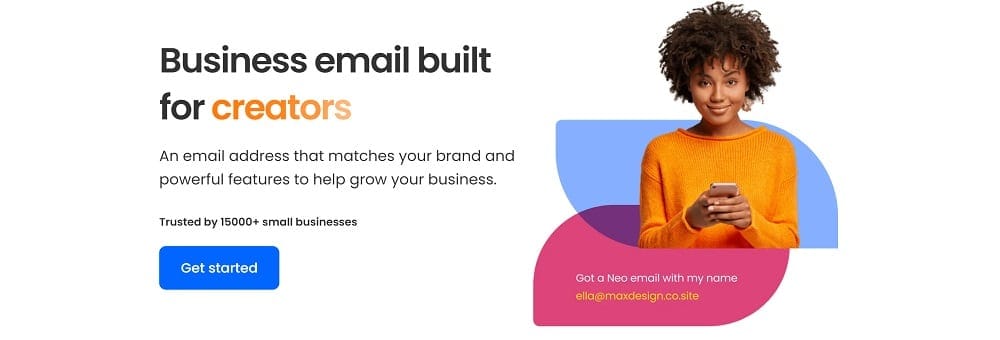
Neo is ideal for entrepreneurs and small businesses requiring professional email addresses. You can create a one-page website free of charge to use its domain as your email address; setup with Neo is quick and straightforward while offering tools that foster brand growth and protection.
Smart Write is an AI tool that uses your inputs, such as tone and length, to quickly compose messages that meet your specifications. Additional features such as scheduled sending, templates, read receipts and follow-up reminders make Smart Write ideal for freelancers, business owners, and influencers.
Neo has now moved away from offering free-for-life plans and instead provides a 15-day trial, after which you must subscribe to one of their paid plans in order to access all features. A higher-tier plan may also be necessary.
Pros:
- Provider offers business emails paired with free domains.
- Professional interface designed for optimal user experience.
- Enhance functionality with email templates, read receipts, and integrated mail forms.
- Robust support and guidance for newcomers are available.
- Take advantage of up to 100GB of storage capacity with generous memory capacities.
Cons:
- While a 15-day free trial is offered, getting into its features requires going through an in-depth setup process first.
- An offer of a free domain comes at the price of an annual subscription.
- For certain businesses, the 30 MB attachment ceiling could present challenges.
- As it’s still relatively new, this service may still be fine-tuning its offerings.
- Users with pre-existing domains are allowed to utilize subdomains instead of full domains.
5. iCloud Free Mail

Apple enthusiasts should sign up for iCloud Mail, Apple’s complimentary email service that requires an @icloud.com address on iOS or Mac devices to use. iCloud Mail easily integrates across Apple gadgets for easy email management across devices.
Apart from its seamless integration, iCloud Mail also excels in customer support, offering phone and chat assistance as well as the Apple Support app for troubleshooting purposes.
However, while iCloud Mail boasts standard features like one-click unsubscribing and advanced search, as well as 5GB of free storage, its lack of compatibility with non-Apple devices and sophisticated inbox organization may make it unsuitable for some users.
Pros:
- Signing off email lists is straightforward.
- Includes 5GB of free online storage.
- Functions on both computer and mobile devices.
Cons:
- It is not as advanced as some other providers.
6. Zoho Mail
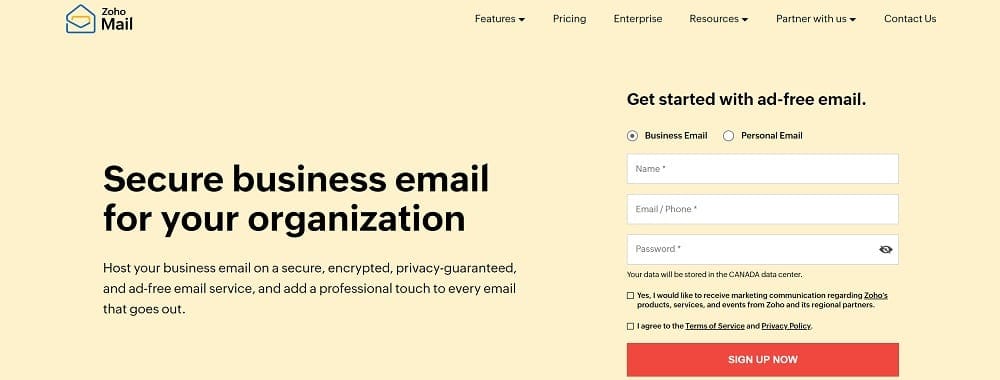
Zoho Mail is part of Zoho’s cloud office suite and stands out by providing custom domain email addresses for businesses while offering superior security with encryption, two-factor authentication, anti-spam, and antivirus features. Furthermore, its free plan offers generous storage capacity per user—an attractive feature to small business owners looking for reliable email providers.
Zoho offers more than email; its comprehensive toolbox also includes tools for calendar management, note-taking, task creation, and contact management, all of which are accessible via their Android and iOS mobile apps. Their comprehensive services make Zoho an attractive option for entrepreneurs as a stand-in to other popular email providers.
Pros:
- A professional and organized email experience.
- Provides access to many useful business apps and features.
- Engaging, in-depth orientation covering 17 key features.
Cons:
- Multi-step setup process.
- Apps and features may be overwhelming if you’re searching for an accessible tool.
- Attachments have a maximum size limit of 25MB per email sent, making sending attachments an ongoing struggle.
7. Proton Mail
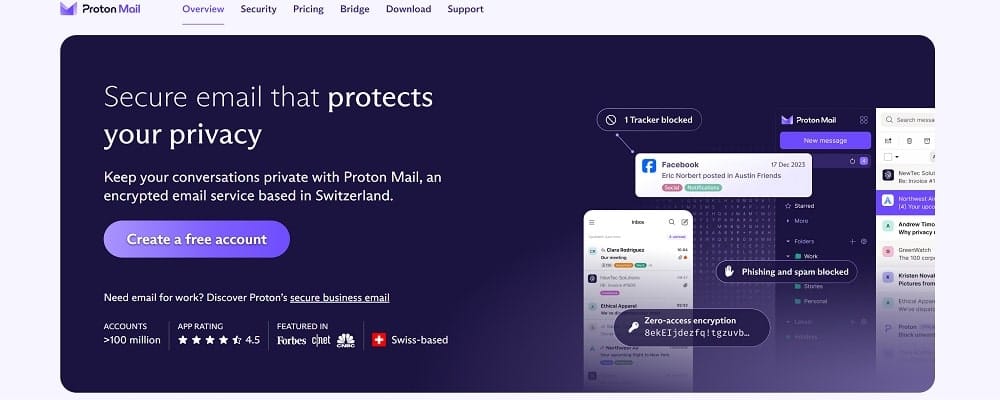
Concerned about surveillance and data exploitation? For a secure yet free email experience, try Proton Mail for business. It encrypts emails client-side, blocks tracking, and conceals your IP, setting itself apart from other providers. Furthermore, Proton Mail boasts unique features like password-protected emails, which cannot be found elsewhere, as well as helpful organization tools and comprehensive search capabilities – setting itself apart even further!
Proton Mail doesn’t support third-party email clients due to its security-focused design, but you can easily migrate emails from other accounts using Proton’s integration tools.
Pros:
- Relies heavily on email encryption technology to protect confidential email data.
- Send secure emails to anyone, even those not using Proton Mail.
- Set an email’s expiry date.
Cons:
- Limited to one GB of Storage Space.
- Free accounts are restricted to sending 150 messages daily.
- No Vacation Responses. – Only Three Folders/Labels Supported.
- Free users have limited scheduling options available to them.
8. Mail.com

Mail.com stands out as an outstanding free email service with its generous 30MB attachment limit – this far surpasses most competitors’ 20-25MB limits and simplifies sending larger files. Though standard features like an integrated calendar and cloud storage are offered, Mail.com lacks advanced organization or spam filter features in favour of providing straightforward email capabilities without extra costs or domain registration requirements.
Pros:
- Impressive attachment limits (30MB).
- Basic email interface.
Cons:
- Lackluster spam filtering.
- Lots of ads and security concerns.
9. AOL Mail

AOL Mail continues to offer robust free email solutions with its generous 1TB storage for each user, featuring core features like inbox organization and spam filters as well as some advanced options unavailable elsewhere – ideal for basic communication needs as well as managing large volumes of emails or attachments.
Pros
- Large text options are fantastic for accessibility purposes.
- Simplified tools make it simple for all kinds of users to create, organize, and send emails quickly and effortlessly.
- The “Views” section offers storage spaces to save contacts, photos, documents, subscriptions, and travel plans.
Cons:
- Some add-on features feel outdated.
- Ads and headlines dominate a significant portion of the screen and can become extremely distracting.
- Helpful icons on the right sidebar represent calendar features, but they are hard to discern because they are so small compared to clickable ads.
10. Tuta

Tuta stands out among free email service providers by offering an ad-free, secure experience. It features end-to-end encryption for your inbox, calendar, and contacts as standard features – this advanced security ensures data collection without consent is prevented, as well as tracking attempts blocked by blocking tracking attempts, and their advanced encryption ensures top-tier protection from tracking attempts and tracking attempts. Plus, they refrain from including AI integrations to prioritize privacy over trends – appealing to those concerned about AI security risks.
Pros:
- Email encryption automatically.
- Send secure emails to non-users.
- Multiple domain options for new accounts.
- Requires a secure email password.
Cons:
- Provides only 1GB of storage capacity.
- Some features require an active paid account.
5 paid email service providers
If you are unsatisfied with free email service providers, many paid alternatives exist. Here are 5 of them:
1. MailChimp
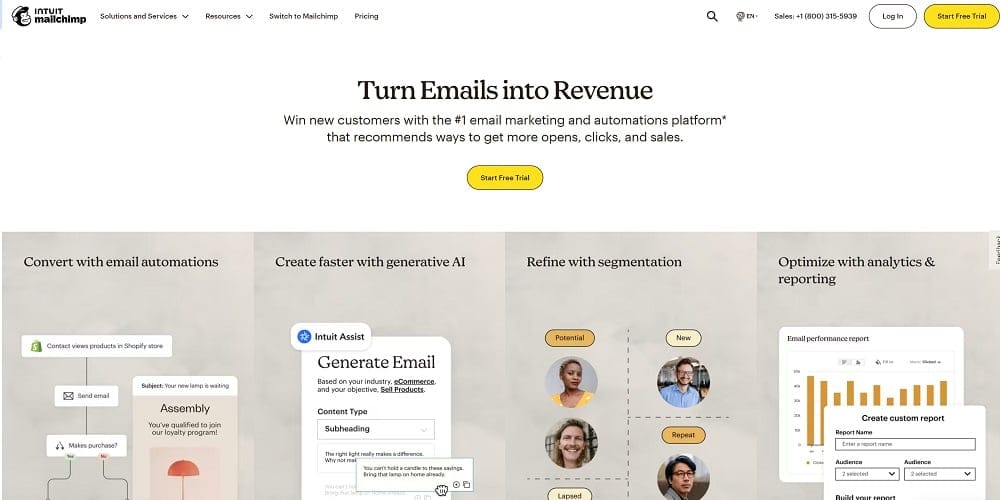
Email marketing remains essential, and MailChimp stands out in this field by sending over 10 billion emails monthly and signing up 14,000 new users daily due to its user-friendliness and seamless e-commerce integrations.
MailChimp offers free email marketing up to 12,000 emails a month; for anything beyond this threshold, users may select from either Growing Business or Pro plans, with Pro Support being one of many reasons that make MailChimp a great alternative to free email service providers.
Pricing: Send up to 10,000 emails per month to as many as 2,000 contacts for free or pay $9.99/month for the most affordable premium plan.
2. Pabbly Email Marketing

Pabbly Email Marketing provides an efficient alternative to MailChimp for emailing bulk lists at an economical cost. With simplified SMTP setup and unlimited delivery through one or multiple servers, preventing account suspension due to SMTP issues.
Pabbly offers a drag-and-drop builder, 500+ templates, customizable tags, signup forms, and CSV contact import. Renowned companies such as Cisco and Avaya utilize Pabbly, which offers flexible pricing plans tailored specifically to each business size and need.
Pricing: Send 12,000 emails to 1,100 subscribers for free or pay $24/month for the most affordable subscription plan available.
3. Sendloop

Sendloop offers a comprehensive email service, making the creation and follow-up of marketing emails easier. Widely recognized as one of the top private email services, Sendloop features include an email slicer, Facebook lead ads integration, efficient lists management tools such as subscriber import, quick subscriber import speed, and quick subscriber import speeds; mobile apps; comprehensive reporting capabilities, customizable email templates as well as integrations with other leading email services.
Pricing: Unlimited emails from $9.00/month.
4. Constant Contact
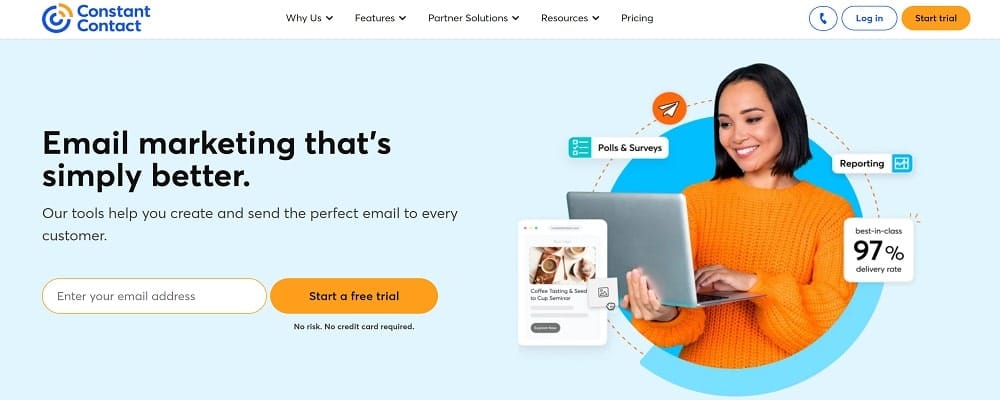
Established in 1995, Constant Contact is an email marketing platform tailored to small—to mid-sized businesses that is widely respected for its user-friendly platform and high conversion rates. Business owners can easily create professional campaigns without needing marketing expertise, resulting in high conversion rates.
The platform offers an intuitive drag-and-drop email editor, making mobile-responsive emails without coding skills easy to create. Email automation and targeted campaigns based on user interaction are easily set up. Furthermore, robust tools for growing email lists and reaching potential customers are provided as part of this solution.
Constant Contact excels in email delivery with its industry-leading 98% deliverability rate, guaranteeing emails reach customer inboxes effectively despite higher costs. Many businesses prefer Constant Contact as their go-to platform for email marketing needs.
Pricing: $20/month to send unlimited emails and $45/month to unlock additional features.
5. ConvertKit

ConvertKit is an email service designed specifically for content creators. Designed by Nathan Barry for bloggers, it is suitable for everyone. Its focus is on ease of use so users can focus on creating rather than marketing through emails.
ConvertKit takes great pride in expanding your email list, offering tools like GDPR-compliant customizable opt-in forms and code-free landing pages. It also features a dashboard featuring key metrics and in-depth reporting features to increase campaign effectiveness.
Pricing: Start at $29 a month for a maximum of 1,000 contacts.
Final Words
Finding an email service provider tailored to your needs and preferences can be challenging. From storage capacity and security features to integration with other services, there’s an email provider out there for everyone – test them all out to find which best meets your communication style in 2024!
If you need a blogger outreach service, our team is here for you. Contact us now to learn more about our SEO strategies. Meet us on Facebook and X.



In Need of a Good VPN? Here is a List Based on Reliability, Speed, and Security
Top eCommerce Plugins for Creative Agencies to Sell Digital Products